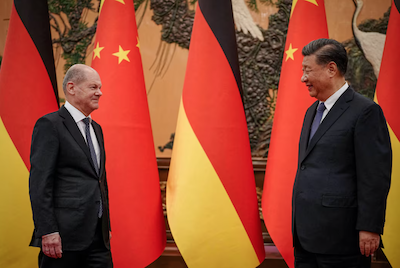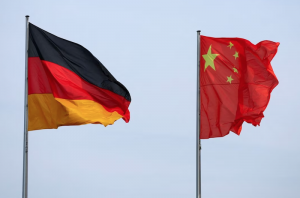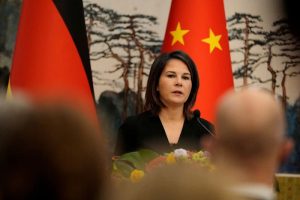Germany remains highly dependent on China for a whole host of products and raw materials despite recent efforts to decouple itself from the world’s second biggest economic power.
A German Economic Institute report, released on Tuesday ahead of Chancellor Olaf Scholz’s trip to China this week, showed that while overall imports from China dropped by nearly a fifth between 2022 and 2023, the share of product groups for which Germany relies on China for more than half of its imports has barely changed, including chemicals, computers and solar cells.
For some categories, such as pharmaceuticals and rare earths such as scandium and yttrium, Germany’s dependence has even increased.
“A clear structural de-risking – in the sense of a continuing trend towards further significant declines in imports – is therefore not yet apparent,” the study said.
Also on AF: Fears Rising on Impacts From Unrestrained AI Projects
Some 73 product groups were removed from the list of goods for which Germany relies heavily on China but a similar number was added in their place, meaning the total number fell only slightly to 200 from 213.
The study was published ahead of Chancellor Olaf Scholz’s trip to China this week, with companies pressing for what they characterise as fairer access to the Chinese market and Europe worried about Chinese excess capacity flooding its market.
The trip is Scholz’s first to China since Berlin drew up a China strategy last year that urged a “de-risking” to reduce economic exposure to the world’s second-largest economy, but was vague on specific measures or binding targets.
Germany has become increasingly wary of tethering itself to a country it has described as both a partner and a systemic rival, in particular after Russia’s invasion of Ukraine in 2022 laid bare Europe’s reliance on Russian gas shipments.
Scholz will take with him chief executives from the likes of Siemens and Mercedes, as well as cabinet ministers, underscoring Beijing’s continued importance.
- Reuters with additional editing by Sean O’Meara
Read more:
China Manufacturers Rivalling Germany In Home EU Market
Beijing Slams Germany’s China Strategy Paper on De-Risking
China Chip Metal Curbs See Germany Urge Faster ‘De-Risking’
China’s Economic Aggression a Global Threat, says Germany
China Becoming More Rival Than Partner: Germany’s Baerbock























